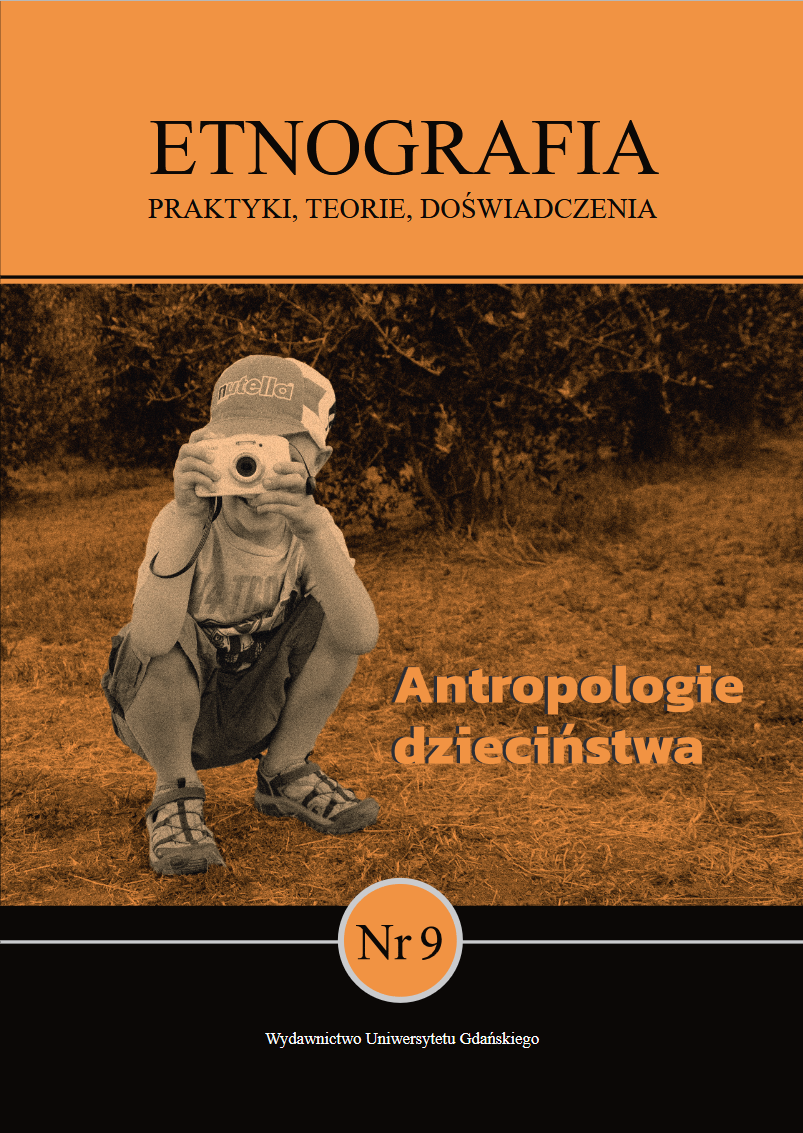Pomaga czy jednak przeszkadza? Muzyka w procesie budowania relacji rodzic–dziecko w rodzinach o zróżnicowanym pochodzeniu społecznym
DOI:
https://doi.org/10.26881/etno.2023.9.08Słowa kluczowe:
cultural stratification, music, lifestyle, family, parent-child relationshipAbstrakt
The main purpose of the article is to try to show how music "works" in family relations and to what extent it allows to create and sustain relationships between parents and children. The analysis is based on the results of a qualitative study involving 40 families with diverse social origins. First, it should be noted that if parents are interested in music and treat it as an important element in their lives, then regardless of their social background, they will be actively involved in the musical socialization of their children. In this aspect, the greatest variation of strategies can be seen in representatives of the so-called cultural elite (obligatory model) and owners (emotional, unforced and casual approach). Moreover, socialization to music in the family is therefore not a one-way process. Children co-create the family musical adventure, often serving as a guide to the world of music for their parents. Moreover, the diversity of musical roles within the family is apparent. It turned out that for the young respondents, the father is more important in dealing with music. Although it should be noted that in farmers and working-class families the important role of the mother as the person animating family musical life is noticeable. The overall strength of parental influence weakens as the importance of peer groups increases, but it is clear that the primal musical socialization in the family continues to be reflected in the activities of growing children.
Downloads
Bibliografia
Bennett, P.R., Lutz, A.C., Jayaram, L. (2012). Beyond the schoolyard: The role of parenting logics, financial resoaurces, and social institutions in the social class gap in structured activity participation. Sociology of Education, 85(2), 131–157. https://doi.org/10.1177/0038040711431585.
Bennett, T., Wright, D., Gayo-Cal, M., Silva, E., Savage, M., Warde, A. (2009). Culture, class, distinction. London – New York: Routledge.
Białkowski, A., Migut, M., Socha, Z., Wyrzykowska, K.M. (2014). Muzykowanie w Polsce. Badanie podstawowych form aktywności muzycznych Polaków. Warszawa: FMJDW.
Bihagen, E., Katz-Gerro, T. (2000). Culture consumption in Sweden: The stability of gender differences. Poetics, 27, 327–340.
Bourdieu, P. (1973). Cultural reproduction and social reproduction. W: R. Brown (red.), Knowledge, education and cultural change. Papers in the sociology of education (s. 71–112). London: Tavistock Publications.
Bourdieu, P. (2005). Dystynkcja. Społeczna krytyka władzy sądzenia. Warszawa: Wydawnictwo Naukowe Scholar.
Cali, C. (2020). Music in family dynamics and relationships: A case study. Qualitative Research in Music Education, 1(2), 63–83.
Conkling, S.W. (2018). Socialization in the family: Implications for music education. Update: Applications of Research in Music Education, 36(3), 29–37.
Crozier, R. (1997). Music and social influence. W: D.J. Hargreaves, A.C. North (red.), The social psychology of music (s. 67–83). Oxford: Oxford University Press.
Davidson, J.W., Borthwick, S.J. (2002). Family dynamics and family scripts: A case study of musical development. Psychology of Music, 30(1), 121–136.
DeNora, T. (2009). Music in everyday life. Cambridge: Cambridge University Press.
Domański, H., Sawiński, Z. (1995). Narzędzia międzykrajowych analiz porównawczych: klasyfikacja zawodów Erikson – Goldthorpe – Portocarero (EGP). Studia Socjologiczne, 3–4(138–139), 41–61.
Domański, H., Przybysz, D., Wyrzykowska, K.M., Zawadzka, K. (2021). Dystynkcje muzyczne. Stratyfikacja społeczna i gusty muzyczne Polaków. Warszawa: Wydawnictwo Naukowe Scholar.
Domański, H., Przybysz, D., Wyrzykowska, K.M., Zawadzka, K. (2022). Praktyki wychowawcze a transmisja wzorów kulturowych w rodzinie. Kultura i Społeczeństwo, 66(1), 123–148.
GUS [Główny Urząd Statystyczny] (2020). Uczestnictwo ludności w kulturze w 2019 r. GUS.
Grácio, R. (2016). Daughters of rock and moms who rock: Rock music as a medium for family relationships in Portugal. Revista Crítica de Ciências Sociais, 109. https://doi.org/10.4000/aof.7782.
Ho, L., Wheaton, B., Baumann, S. (2021). A life course perspective on cultural capital acquisition: How the timing and duration of musical socialization affect the taste for classical music and opera. Poetics, 84, 1–20.
Jabłońska, B. (2014). Socjologia muzyki. Warszawa: Wydawnictwo Naukowe Scholar.
Jeziński, M. (2011). Muzyka popularna jako wehikuł ideologiczny. Toruń: Wydawnictwo Naukowe UMK.
Kotarba, J. (2018). The family. W: J. Kotarba (red.), Understanding society through popular music (s. 45–67). London – New York: Routledge.
Lareau, A. (2011). Unequal childhoods: Class, race, and family life. Berkeley-Los Angeles: University of California Press.
Lash, S., Urry, J. (1994). Economies of signs and space. London: Sage Publications.
McPherson, G. (2009). The role of parents in children’s musical development. Psychology of Music, 37(1), 91–110.
Merriam, A.P. (1964). The anthropology of music. Northwestern University Press.
Mohr, J., DiMaggio, P. (1995). The intergenerational transmission of cultural capital. Research in Social Stratification and Mobility, 14, 167–199.
Pęczak, M. (2005). Kultura targetu. W: W.J. Burszta, M. Czubaj, M. Rychlewski (red.), Kontrkultura. Co nam z tamtych lat? (s. 45–67). Warszawa: Wydawnictwo SWPS Academia.
Pęczak, M. (2013). Subkultury w PRL. Opór, kreacja, imitacja. Warszawa: Narodowe Centrum Kultury.
Reeves, A. (2015). ‘Music’s a family thing’: Cultural socialisation and parental transference. Cultural Sociology, 9(4), 493–514.
Willekens, M., Daenekindt, S., Lievens, J. (2014). Whose education matters more? Mothers’ and fathers’ education and the cultural participation of adolescents. Cultural Sociology, 8(3), 291–309.
Wyrzykowska, K.M. (2017). Muzyka, młodzież i styl życia. O uczestnictwie w kulturze muzycznej warszawskiej młodzieży. Warszawa: WWS.
Zawadzka, K. (2023). Roczniki siedemdziesiąte. Styl życia i wartości inteligencji średniego pokolenia. Warszawa: Wydawnictwo Naukowe Scholar.
Opublikowane
Jak cytować
Numer
Dział
Licencja
Czasopismo wydawane jest na licencji Creative Commons Uznanie autorstwa-Na tych samych warunkach 4.0 Międzynarodowe.

 Uniwersyteckie Czasopisma Naukowe
Uniwersyteckie Czasopisma Naukowe








